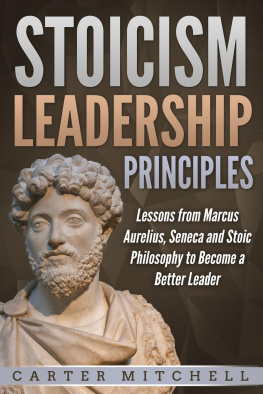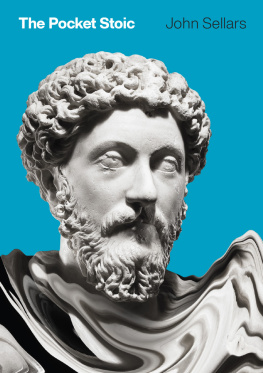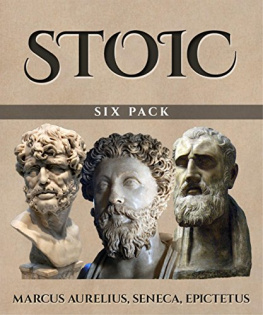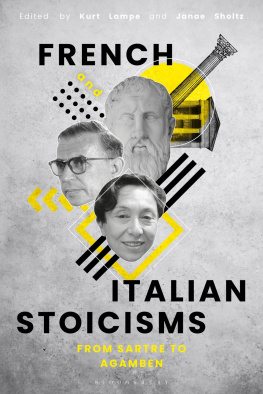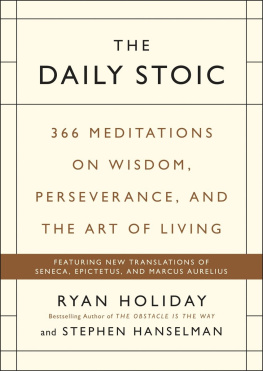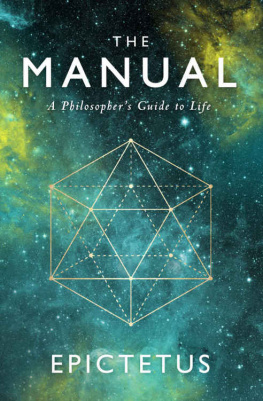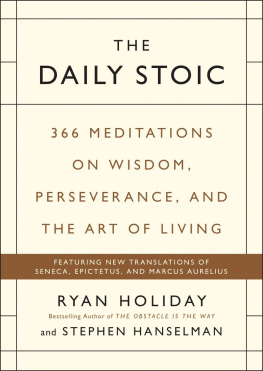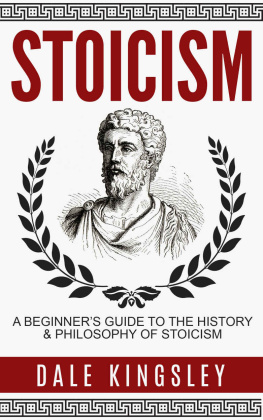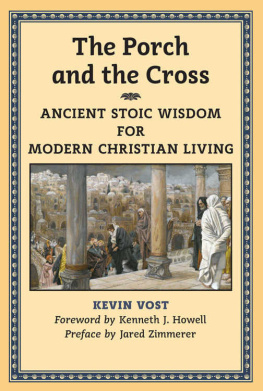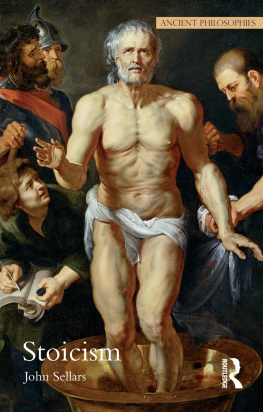THAT ONE SHOULD DISDAIN HARDSHIPS
MUSONIUS RUFUS
THAT ONE SHOULD DISDAIN HARDSHIPS
The Teachings of a Roman Stoic
Translated by
CORA E. LUTZ
With an Introduction by
GRETCHEN REYDAMS-SCHILS
Yale UNIVERSITY PRESS
New Haven and London
Copyright 2020 by Yale University. English translation originally published in Yale Classical Studies volume 10 by Yale University Press in 1947.
All rights reserved.
This book may not be reproduced, in whole or in part, including illustrations, in any form (beyond that copying permitted by Sections 107 and 108 of the U. S. Copyright Law and except by reviewers for the public press), without written permission from the publishers. Yale University Press books may be purchased in quantity for educational, business, or promotional use. For information, please e-mail (U.K. office).
Designed by Sonia L. Shannon.
Set in Caslon type by Newgen North America.
Printed in the United States of America.
Library of Congress Control Number: 2019940796
ISBN 978-0-300-22603-4 (hardcover : alk. paper)
A catalogue record for this book is available from the British Library.
This paper meets the requirements of ANSI/NISO Z39.481992 (Permanence of Paper).
10 9 8 7 6 5 4 3 2 1
Contents
Introduction
The Stoic philosopher Musonius Rufus was one of the most influential teachers of his era, imperial Rome, and his message still resonates with startling clarity. He excelled at quietly subverting traditional expectations and conventional values. We can occasionally detect a dry sense of humor, and he has a way of getting under his readers skin, not through the fire and brimstone of street preachers but by asking, for instance, why we put so much effort into everything except learning to lead the good life. Acrobats, he says, face without concern their difficult tasks and risk their very lives in performing them, turning somersaults over upturned swords or walking ropes set at a great height or flying through the air like birds, where one misstep means death, all of which they do for a miserably small recompense, so shall we not be ready to endure hardship for the sake of complete happiness? (That One Should Disdain Hardships). True enough, the Stoic view of the good and happiness would turn our usual value system upside down. This kind of good might sound quite strange to us, just as it probably did to many people of Musoniuss time if they had not been exposed to philosophy or Stoicism before. But if we cannot shake the suspicion that in daily life we ourselves have actually become acrobatsjust as in Musoniuss days one misstep in the highly charged atmosphere of a Roman emperors court could mean deathit might be worth listening to and thinking about what he has to say, given that nothing less than happiness is at stake.
Musonius Rufus was born around 30 CE in Vulsinii, now modern Bolsena in Italy, into a family of equestrian rank. He taught or influenced many elite Romans of his day, as well as the Stoic Epictetus and the orator Dio of Prusa. His reputation is confirmed even by the Christian Origen, in his Contra Celsum. As representatives of the best life, Origen mentions Heracles, Odysseus, Socrates, and among those who have lived quite recently, Musonius. To be mentioned in one breath with Socrates was the highest praise one could earn in antiquity among those who appreciated philosophers not just for their views but also, and more importantly, for the exemplary lives the best among them led. Tellingly, Musonius is listed alongside such mythical heroes as Heracles and Odysseus (who in their turn were often used as role models by philosophers, especially the Cynics and the Stoics).
Musonius Rufus appears to have left little, if anything, in writing himself. The sources come in two broad categories: first, in the form of a series of lectures (sometimes abridged) recorded allegedly by a certain Lucius, and second, as fragments and sayings preserved in the works of other authors, among which the fragments attributed to Epictetus are especially valuable because he is a Stoic too, and Musonius Rufus was one of his teachers. Additionally, because being a Stoic in this period implied certain modes of behavior, the biographical anecdotes about Musonius are also important. These stories are meant to reflect his identity as a philosopher, and they help us understand why Musonius Rufus made such an impression on his contemporaries and was such a remarkable figure.
Musonius Rufus as a Stoic
Musonius Rufus shares important features with other Stoics of the Roman imperial era such as Seneca, Epictetus, and Marcus Aurelius. They tend to downplay the importance of the more technical aspects of philosophy in favor of an emphasis on ethics, or, more precisely, on an ethics in action, displayed in all aspects of life. For this message of exemplary behavior and attitudes they coopt Socrates and the Cynics, the latter in a sanitized and perhaps less entertaining version, in which they cease urinating, masturbating, or copulating in public. The later Stoics also minimize the authority of teachers, whether the Stoics of the earlier Hellenistic era or themselves, and emphasize the irreducible moral responsibility of individual agents. Merely learning philosophical doctrine and listening to lectures, they state, will not do us any good unless we manage to interiorize the teachings and apply them to daily life.
The strongest version of a Stoic focus on an ethics in action can be found in the views attributed to Musonius Rufus. For him philosophy is nothing else than to search out by reason what is right and proper and by deeds to put it into practice (Is Marriage a Handicap for the Pursuit of Philosophy?). If work is balanced with sufficient leisure for study and discussion, this mode of interaction is optimal, Musonius avers, because the teacher simultaneously sets an example by putting his principles into action and displaying virtue in his way of life. Roman sociocultural elites would occasionally flirt with their version of the simple life and the pastoral idyll (not unlike the wealthy today, we might add), but Musoniuss recommendation entails nothing less than a complete overhaul of their lifestyle. Musonius emphasizes the importance of habituation and prescribes two kinds of exercises, one for the soul by itself, the other for the soul and body together.
Imagine how limited our understanding of Socrates would be if we only had Xenophons account and not Platos! The genre of the sayings attributed to Musonius leaves even less room for references to philosophical doctrine. As in Epictetuss case, however, the recorded lectures reflect only part of Musoniuss teaching activity. Yet even within the literary conventions and constraints of this framework we can clearly detect shorthand references to key Stoic tenets, even if these are not fully developed in all their more technical implications. We get a glimpse, for instance, in the first discourse of the value Musonius accords to logic. In this lecture Musonius recommends adapting a teachers use of logical proofs to the aptitude of any given pupil.
The examples of proofs he provides about how to distinguish the true good from apparent goods, and the true evil from apparent evils, right away steer his audience implicitly toward the tenet for which the Stoics were perhaps the most (in)famousnamely, that virtue in the form of perfected reason counts as the only good and vice as the only evil, and thus that most things over which human beings get worked up strictly speaking do not count as good. Physical well-being would still, on the whole, be preferable to bodily harm, or sustenance to starvation, but if circumstances are such that, for instance, we are called upon to sacrifice our life for our friends or country, then we should be able to let go of physical self-preservation and food.
Next page

